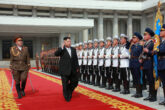February 22, 2018
Five reasons the Olympics haven't solved the North Korea problem
Both during the run-up to the PyeongChang Olympics and during the Winter Games, the tensions over North Korea’s nuclear weapons have appeared to relax significantly. Reports that Vice President Pence’s bellicose rhetoric derailed diplomacy with the North, however, reveal a harsher reality. After the Olympics are over, the temperature between Washington and Pyongyang will almost certainly spike again. Here are five reasons.
Inter-Korean diplomacy isn’t about nuclear weapons. The cooler temperatures on North Korea come from inter-Korean diplomacy — not diplomacy that includes the United States or other major powers. President Moon Jae-in of South Korea calculated that it was more advisable to have North Korea participate in the Olympics than to let North Korean leader Kim Jong Un spoil things from the periphery, potentially testing missiles or nuclear weapons just 60 miles to the north. The two countries have discussed holding more formal talks after the Olympics are over, including a possible summit meeting.
However, inter-Korean diplomacy is primarily focused not on North Korea’s weapons programs but on issues specific to North and South Korea, like reuniting families divided by the Korean War. What’s more, while in South Korea, Pence insisted that the North Korean presence at the Olympics was a “charade,” called the regime “tyrannical” and urged that the pressure campaign against it continue, suggesting a very different approach.
Read the full article in The Washington Post.
More from CNAS
-
Trump’s Audacious Success
This article was originally published in The Atlantic. Nicolás Maduro and his wife awoke yesterday in a safe house on a heavily fortified military base in the center of Caraca...
By Richard Fontaine
-
North Korea and Russia’s Deepening Axis
2025 was the year North Korea turned a corner, not just through provocations, but by actively repositioning itself in the global power game. Its military partnership with Russ...
By Dr. Go Myong-Hyun
-
CNAS Insights | Eight Things to Watch for in 2026
Buckle up for a pivotal geopolitical year. In 2026, the world will struggle to make sense of U.S. actions and intentions, and Washington will remain uncertain about its own pl...
By Richard Fontaine
-
North Korea in Motion: New Moves, Sharper Risks, and Shifting Regional Responses
As 2025 winds down, tensions on the Korean Peninsula are escalating once again.North Korea is sending thousands of workers to Russian drone factories, stepping up cyber theft ...
By Dr. Go Myong-Hyun




